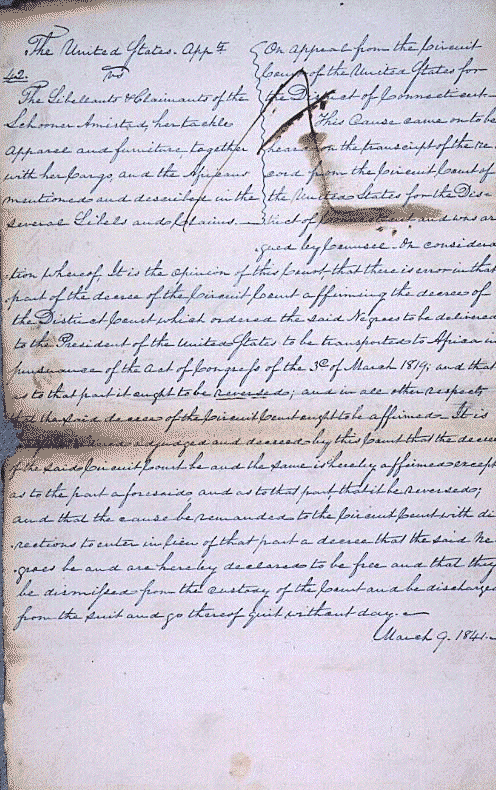This text is part of the Teaching Hard History Text Library and aligns with Key Concept 5.
Majority Opinion of the Supreme Court given by Joseph Story
It is also a most important consideration in the present case, which ought not to be lost sight of, that, supposing these African negroes not to be slaves, but kidnapped, and free negroes, the treaty with Spain cannot be obligatory upon them; and the United States are bound to respect their rights as much as those of Spanish subjects. The conflict of rights between the parties under such circumstances, becomes positive and inevitable, and must be decided upon the eternal principles of justice and international law. If the contest were about any goods on board of this ship, to which American citizens asserted a title, which was denied by the Spanish claimants, there could be no doubt of the right of such American citizens to litigate their claims before any competent American tribunal, notwithstanding the treaty with Spain. A fortiori, the doctrine must apply where human life and human liberty are in issue; and constitute the very essence of the controversy. The treaty with Spain never could have intended to take away the equal rights of all foreigners, who should contest their claims before any of our Courts, to equal justice; or to deprive such foreigners of the protection given them by other treaties, or by the general law of nations. Upon the merits of the case, then, there does not seem to us to be any ground for doubt, that these negroes ought to be deemed free; and that the Spanish treaty interposes no obstacle to the just assertion of their rights.
… When the Amistad arrived she was in possession of the negroes, asserting their freedom; and in no sense could they possibly intend to import themselves here, as slaves, or for sale as slaves. In this view of the matter, that part of the decree of the District Court is unmaintainable, and must be reversed.
The view which has been thus taken of this case, upon the merits, under the first point, renders it wholly unnecessary for us to give any opinion upon the other point, as to the right of the United States to intervene in this case in the manner already stated. We dismiss this, therefore, as well as several minor points made at the argument.
Upon the whole, our opinion is, that the decree of the Circuit Court, affirming that of the District Court, ought to be affirmed, except so far as it directs the negroes to be delivered to the President, to be transported to Africa, in pursuance of the act of the 3d of March, 1819; and, as to this, it ought to be reversed: and that the said negroes be declared to be free, and be dismissed from the custody of the Court, and go without d[el]ay.
